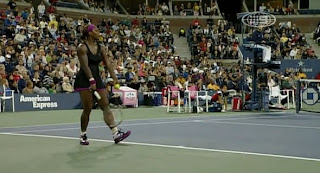 It has been two weeks since the controversial ending to the US Open semifinal match between Serena Williams and Kim Clijsters that garnered worldwide attention. For many who did not see the moment live, social media provided opportunities to revisit it in visual detail. In the two weeks since the semifinal match, I found over 20 YouTube sites (including this one: http://www.youtube.com/watch?v=EE6Z5Q2tOk4&NR=1) that featured video footage of, or related to, Williams' footfault and her subsequent default. As of September 26, 2009, 3,365,889 views were recorded on those 20 sites alone. Nearly 10,000 viewers left Comments on these YouTube sites while countless others reacted to the news via facebook and Twitter.
It has been two weeks since the controversial ending to the US Open semifinal match between Serena Williams and Kim Clijsters that garnered worldwide attention. For many who did not see the moment live, social media provided opportunities to revisit it in visual detail. In the two weeks since the semifinal match, I found over 20 YouTube sites (including this one: http://www.youtube.com/watch?v=EE6Z5Q2tOk4&NR=1) that featured video footage of, or related to, Williams' footfault and her subsequent default. As of September 26, 2009, 3,365,889 views were recorded on those 20 sites alone. Nearly 10,000 viewers left Comments on these YouTube sites while countless others reacted to the news via facebook and Twitter.I have been intrigued by the overwhelming response to the events that occurred in the semifinal match between Serena Williams and Kim Clijsters. I have been especially interested in examining what this outpouring means in terms of how global racism operates in the year 2009. And I have been saddened to see so much racist vitriol expressed by some viewers of the YouTube links. Using Twitter, I discovered an article on Mashable, a link that measures the activity on social networking sites. According to Fisher (2009), “conversation on Facebook (was) mixed, but a search for ‘Serena Williams’ show(ed) up the majority of comments as being fairly derogatory” (¶ 2). Meanwhile, “a Twitter sentiment analysis tool” revealed that “the negative sentiment (was) overwhelming” (¶ 5). A search on google indicated that “reference to the outburst was already ranking at number 3 on a search for ‘serena williams’ (¶ 6). As to why the “majority of the commentary (was) overwhelmingly negative,” Fisher (2009) suggested that “a look at the discussion on the Serena Williams Facebook page shows that there is plenty of support out there for Serena Williams but it is confined to the space designed for fans” (¶ 7). Fisher further predicted that Serena's reputation was “undoubtedly taking a massive hit... The fact that the video (was) already ranking at number 3 in Google demonstrate(d) the power of social media and the need to build up a loyal online following” (¶ 8).
I have observed loyalty to Serena Williams in several ways: through comments that have been posted on her blog and Twitter sites, and from listening to students discuss the incident in my "Sport & Gender" classes. Yet, I am still disturbed by the racist slurs made by commenters who seem to feel justified in expressing hateful sentiments because of the error in judgment that was made by Serena. This goes beyond "sincere fictions" that Feagin and Vera identified in their work. This seems like a simmering hatred that has been brewing beneath the surface, waiting to be unleashed by an incident like this, that seemingly justifies such hateful rhetoric. This is a new, more blatant, in-your-face racism that is more troubling than ever. In a world where "free speech" is a valued commodity, how can we address this new form of racist hatred?

4 comments:
What Serena did was wrong, lets not forget that part. I believe she dropped some words that did not need to be said. The comments that are made on line are bad and very disgusting. Is racism still around YES! But it works both ways.
I cannot disagree with your statement that what Serena said was inappropriate. She agrees with that. Even though she is not the first person to say those things, that does not justify what she said. However, I am not sure what it means to say that racism works both ways. Oppression works primarily in one direction. So if you are suggesting that there is "reverse discrimination," I cannot agree with that. And I am not sure how that would apply to the cases of Indian Wells or the 2009 U.S. Open.
I agree with what The Tennis Prof Chronicles i do not not the racism works both ways please further elaborate on that comment.. For the Indian Wells situation that occurred I don't understand how your theory is implied there or the faulting situation.
I wanted to follow up on something else that was said in the 11:30 class--i.e., I think it was in Dylan's group. He stated that when I asked the question, "Now can you see why the Williams' sisters did not want to return to Indian Wells," no one could understand why they did not want to return. I wanted to point out that the comments written by students (which are available on Blackboard; see "Course Documents") seem to reflect that quite a few students did understand why Venus and Serena did not want to return and have continued to boycott Indian Wells. In fact, one person suggested that more of the players should support them. And I agree with that as well.
Post a Comment